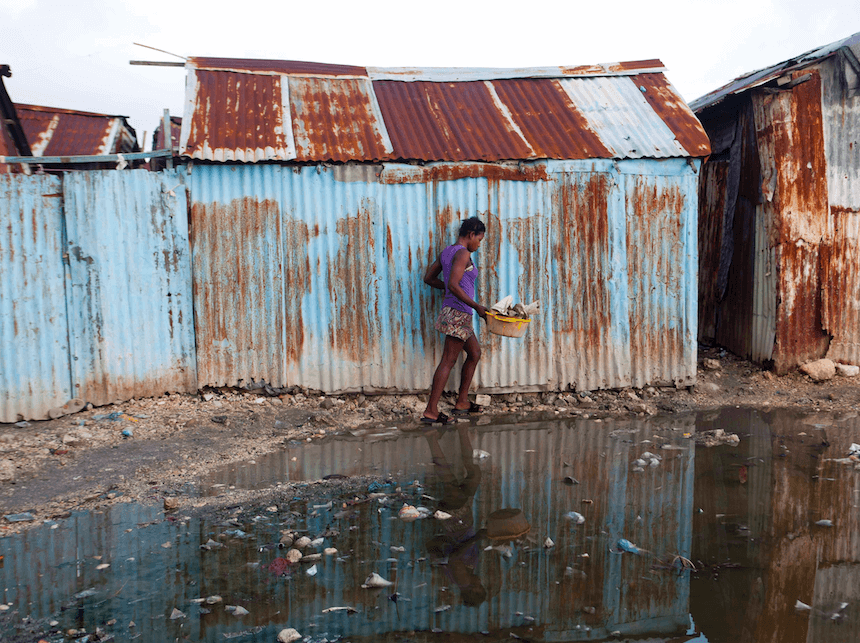Tag: Laura Arango ’20
Hurricane Devastation Beyond Puerto Rico
by The Cowl Editor on October 5, 2017
Opinion

by Laura Arango ’20
Opinion Staff
The Atlantic has suffered through 13 named storms this season: eight hurricanes and five major hurricanes. Specifically Maria, Irma, and Jose have left a trail of disaster in their wake. Homes have been destroyed and countries have been reduced to functioning without power, running water, and food. Thus far, the areas that have been hit hardest by the hurricanes have been the islands of the Caribbean, and they fear being forgotten by the rest of the world.
Unfortunately, that is exactly what seems to be the case. Small islands in the Eastern Caribbean are struggling to meet basic survival needs in the wake of Hurricane Irma. Yet, no one is talking about them!
Both the French and Dutch sides of the island of Saint Martin were in ruin. More than 90 percent of the buildings on the Dutch side were damaged, basically every structure in Cole Bay was wrecked, and the island’s main power plant in Cay Bay was also destroyed.
The island of Anguilla also experienced severe damage. According to the International Organization for Migration, about 90 percent of its buildings and infrastructure were ruined. The island of Barbuda, which has a population of approximately 1,800 people, was said to have “looked like a landfill” by its prime minister.
In fact, in the aftermath of Irma, 75 percent of the buildings in its main town were damaged and Barbuda’s residents were evacuated to the neighboring island of Antigua.
The United States Virgin Islands face extreme hardship. The islands were left without power, air conditioning, and water, and people were sleeping in cots “pushed up against each other with tons of people in them—mostly people that lost their homes,” said Shelby Alfred, a nurse in Cruz Bay, on the island of St. John.
Kurt Nose, who was born in Ohio and moved to St. Thomas stated, “Gas and diesel are starting to run out…Fresh drinking water is starting to get scarce…How long the food we have here will last and how quickly they can get food in here is a question.” The residents of St. Thomas are taking extreme measures to keep their personal belongings safe in the midst of all the chaos. Some are locking down their homes and maintaining an assault weapon on them at all times.
The status of the U.S. Virgin Islands and other Caribbean islands have developed into a full-blown catastrophe. Members of the communities are clearing the roads, helping the reconstruction process, giving supplies to their neighbors, and using their own boats to save the lives of others. It is commendable and a testament to the perseverance of human nature. However, they need outside resources, outside government help, and an abundance of supplies that their own people are not in the condition to retrieve. Laura Dixon Strickling, a member of the St. Thomas community, stated, “We are U.S. citizens, and the U.S. government needs to come and help. They need to send a visible force to make people feel safe so they don’t do desperate things.” This is only one of the many recorded statements from members of destroyed communities pleading for government assistance.
However, too few people are discussing these small islands. The assistance they have gotten is not nearly enough to help the rebuilding process of the islands. President Trump has made statements regarding the fact that the communities need to help themselves more. However, he fails to realize that there are children out on the street cleaning the roads. The people are working toward their pre-hurricane status. However, in order to recreate the beautiful land they lived in before it was destroyed, they need help. And the Providence College community, as well as the entire world, needs to create awareness of these prominent issues. They should not be forgotten simply because they are not a part of the continental United States. Humans are humans and there is still a third of hurricane season in store for us.
Tangents and Tirades
by The Cowl Editor on September 21, 2017
Opinion

Peace Makes The World Go Around
We used to speak of the future as something to look forward to, filled with bright and exciting possibilities. Nowadays, conversations surrounding the future are heavy and loaded—filled with rhetoric that incites fear in many.
Recent events with white supremacists, KKK rallies, and terrorism have evoked waves of anxiety and terror in communities across the globe. They have made people wary of the future to come.
As recent as this past Friday, there was a terrorist attack in a London subway station. Fortunately, there were no fatalities, however, 22 people were injured. This is only one among many acts of terrorism in recent years. In fact, this specific attack was triggered by a homemade bomb.
Realistically, it is quite easy to commit a terrorist attack. Nowadays, simply owning a vehicle makes this possible. However, this should not stop people from continuing on with their lives.
By conceding to our fears we are allowing the evil of the world conquer us. It is not okay to stop one’s life because of fear, and the future does not have to be dark.
Only light can drive out darkness and the only way to do so is by maintaining a positive outlook and striving to do good in the world.
It is upsetting to hear so many people discuss how they cannot bring children into the world because of terrorism, but it is through new generations raised correctly that inhumanity can be wiped out; or at the very least, controlled.
It is easy to discuss all the bad in the world and yes, there is a lot of it, but there is more good.
-Laura Arango ’20
Life Without a Meal Plan
Australian millionaire Tim Gurner achieved brief Internet fame when, in an interview with 60 Minutes, he said, “When I was trying to buy my first home, I wasn’t buying smashed avocado for $19 and four coffees at $4 each.”
All right, Tim, you seem a bit sassy and you’ve irritated quite a few people with your comment, but perhaps you have a point. Earlier this week I bought four cans of tuna, crackers in bulk, and a $6 pint of Ben & Jerry’s Non-Dairy P.B. & Cookies ice cream, all in the same purchase.
I am not ashamed, but what my choices in the ice cream aisle at Shaw’s tell me is that 1) I am Tim’s idea of a millennial, spending what little money I have on ridiculously priced food trends and barely subsisting off canned tuna and old mayonnaise.
And 2) I have absolutely no clue how to adult and less of a clue how to survive off-campus without a meal plan. I’ve been meal plan-less for two years now, and let me tell you, the situation has not improved with age, periodic self-reflection, and bouts of honest intent to reform.
While I may technically know how to budget my money and moderate my sugar intake, I do not follow through. My housemates seem to be better at taking care of themselves, as good humans do; they eat salads and make breakfast smoothies and “pack healthy snacks for later.”
I admire them greatly and hope that one day, perhaps in my 60s, I shall have the discipline and self-control to do the same. But for now, my eating habits reflect the fight-or-flight reflexes of the sympathetic nervous system.
Could it be that some suppressed aspect of my childhood makes me feel the need to eat all food in sight? I like to think that my body is subconsciously preparing itself for the impending bomb-shelter life of the North Korea-Trump-pocalypse, I don’t know.
-Lela Biggus ’18
Miserable State of Alumni Hall
As we wind into October, eating at Raymond Dining Hall has already become monotonous. Every week they serve the same few dishes, and the quality is seriously lacking. Stale bread, dry chicken, cold potatoes, repeat.
Even if I am willing to spend money to escape the tedium of Ray, Providence College does not provide many options to spend it on. In fact, PC’s pay-for-food Alumni Dining Hall has only gotten worse.
Since freshman year I have watched the wings and Mexican stations disappear to only have been replaced with one pay option. The burgers are burned. The deli and Italian stations have few choices, and their prices for heroes are higher than actual Italian deli prices.
Even worse, there are virtually no healthy options besides prepackaged salads, and the free meals are bland and unhealthy.
It does not have to be this way, as other colleges provide better options for their students. Brown’s food was ranked by “The Daily Meal” as #19 in the nation, and their dining hall delivers to your dorm room.
Other schools like University of Scranton, Boston University, and Connecticut College routinely get ranked as top in the nation, as their students enjoy better quality food and a plethora of dining options. For instance, Scranton has 11 different dining hall options.
Make no mistake, our dining halls do not have to be this bad. Others do better, and PC must join the trend.
-Nicholas Moran ’19
Fire and Fury in North Korea
by The Cowl Editor on September 14, 2017
Opinion

by Laura Arango ’20
Opinion Staff
With two world wars already under our belt, the United States may very well be on the verge of a third one. Our infamous president Donald Trump made headlines on Aug. 9 for his powerful promise to unleash “fire and fury like the world has never seen” on North Korea.
Some Americans believe that this form of aggressive rhetoric is exactly how the United States should be approaching global tensions. They claim that President Obama’s soft approach to foreign policy made Trump’s look much more intense than past administrations.
Clearly, his threat did nothing except further escalate tensions between the two countries. Only a day after Trump’s ominous threats, North Korea stated that it was working on a proposal to launch four intermediate-range, Hwasong-12 missiles into the sea. The missiles are in the direct path of the tiny island of Guam, a U.S. territory located in the Pacific Ocean.
It would only take a mere 14 minutes for a missile fired from North Korea to reach Guam. By launching one such missile, North Korea could destroy 160,000 lives in under 30 minutes.
Our president is irrationally threatening a country that holds nuclear weapons within its military arsenal and his staff has had to downplay his words in order to mediate the tensions.
However, it is difficult for staff members to protect their beloved president when he tweets comments such as, “Military solutions are now fully in place, locked and loaded should North Korea act unwisely. Hopefully Kim Jong-un will find another path!”
It is unclear when Twitter became the primary source of communicating world news, but the president seems to be at the frontlines of this revolutionary social media breakthrough.
More recently, it was only this past Sunday that leader Kim Jong-un praised the success of North Korea’s sixth and largest nuclear test in response to the United States’ initiative to drive for tough new sanctions on North Korea, to be upheld by the United Nations.
There was quite literally a party thrown in North Korea celebrating the Sept. 3 successful hydrogen bomb that could be easily fitted onto a rocket.
Kim Jong-un does not seem rattled by the rest of the world’s disapproval of his actions and explicitly demonstrated this carelessness at the dinner he held to congratulate the scientists and others responsible for the nuclear program.
As tensions continue to escalate between the U.S. and North Korea, we can only hope that our Congress and the president will take the correct measures to de-escalate these tensions.
However, given that our president’s primary means of communication is through Twitter, it does not seem hopeful that he will make the correct choices. But perhaps, with pressure from the rest of the world, we can work together in hopes of a positive negotiation with North Korea.
Tangents and Tirades
by thecowl.opinion on May 4, 2017
Opinion

When Will Trump Learn?
This week Trump has taken another hit at women’s rights and efforts to alleviate global gender inequality. The administration has decided to discontinue “Let Girls Learn,” a signature girls’ initiative and educational program that has been especially championed since 2015 by former first lady, Michelle Obama.
This inter-governmental initiative run through the Peace Corps and the United States Agency for International Development was a testament to the importance of bipartisan multi-sectoral efforts in empowering marginalized women to reach their full potential through educational opportunities. Now it is just another reminder of the lack of support Trump continues to demonstrate towards women’s rights.
When will our president realize the importance of equality within our nation and throughout the world? Even within just his first 100 days, his lack of support for this initiative represents just one of the many instances where he has failed to support gender equality and women’s empowerment (from his global gag rule, legislation on federal funding toward Planned Parenthood, etc.)
And while his senior advisor and daughter, Ivanka Trump, has vocalized her intentions of prioritizing women and girls’ issues, the nation is still waiting to hear of any proposals she has to offer. How much longer can we stand to see this administration chip away at national and global efforts to promote equality? Only time will tell just how far the Trump Administration will let women’s rights fall by the wayside….
-Sarah Kelley ’18
Finals: An Unnecessary Evil
Why take finals? Most professors structure their classes to give two to three exams a semester. In addition, students are given consistent homework, projects, readings, and papers. In the course of one semester, students have numerous assignments are subject to be graded and said assignments are substantial enough to demonstrate that students’ knowledge of the subject.
Cumulative finals at the end of the semester are repetitive and stress-inducing. If a student does well throughout the course of the semester, then to assign a final exam worth a significant percentage of one’s grade is equivalent to setting students up for failure.
There is no sleeping during finals week, there is only studying and that in itself is detrimental to our grades. Many college students resort to taking different forms of drugs to stay up to study; others do not believe that it is physically possible to study the amount required and end up giving up on themselves.
If I have a good grade in a class, if I have done my fair share of work and have been a good student, then a final is nothing more than another opportunity to potentially bring my grade down in a class. It’s even more intense when more than one exam is on the same day.
Finals should be optional; they should be an opportunity for those who want to bring their grades up to do so. Those content with what they possess should not have to endure that week of stress, anxiety, and sleeplessness. One of the biggest issues on college campuses is that students are overwhelmingly anxious, and finals week only exacerbates a college student’s anxiety.
-Laura Arango ’20
Justice For Unpaid Interns
What is our time worth?
As the school year comes to a close, Providence College students scramble to finalize their plans for the summer. Some are returning to old summer jobs, a few students are traveling, and a large percentage of students are entering into the “world of interning.”
The internships that catch my eye are contrary to what one would think. You see, they are not the ones with the intriguing titles and detailed descriptions. Nor are they the ones that require the most work, such as research, portfolios, and final summer projects. They are the ones that pay.
Unpaid internships are a concept that I find slightly demeaning and unfair. College students can barely afford meals at the end of a semester, but we expect them to commit to an unpaid internship for the entire semester so that hopefully the experience makes them a prime candidate for the job.
In an unpaid internship a student is almost always doing exactly what a paid interns does. However, the company that decides the internship is unpaid, is making a claim that the work the student is doing is not even worthy of minimum wage. Students should feel respected for doing what they can to get their foot in the door of the working world, not discouraged.
Unpaid internships tell the student that the time he or she gives up in order to be in that learning environment, is worth nothing.
Unpaid is unfair. We may be students, but our time is worth something, not nothing.
-Kelsey Dass ’18
A Trump Victory
by thecowl.opinion on April 27, 2017
Opinion

by Laura Arango ’20
Opinion Staff
Donald Trump—many people are already sick of his name only 100 days into his presidency, and many more people do not have positive things to say about him. I am usually one of those people, so one can imagine how shocked those around me were when I told them I actually agreed with one of his most recent moves: the missile strike against Syria.
There does not seem to be enough public knowledge regarding what this missile strike against Syria actually means. Donald Trump ordered a strike against an airfield in Syria. According to the Pentagon, the missiles “destroyed aircraft, hardened hangars, ammunition supply bunkers, air defense systems and radar at the Shayrat Airfield.”
The missiles did not destroy human lives. The United States’ reasoning behind said missile strikes was to make it clear that the United States stands against Syria’s decision to chemically attack innocent civilians using a deadly nerve agent.
Our president’s stand against the exploitation of human rights and our choice to not consult with Russian officials in our decision to attack is something every American citizen should support.
In the past, our president has urged the United States to shift its primary focus from deposing Syrian dictator Bashar al-Assad to eliminating the threat of ISIS. Now, his position has changed. It seems that our President has had a change of heart about many of his previous promises.
There have been no signs that the Syrians have moved to retaliate and there is no expectation that they will. Former president Barack Obama had a similar issue with Assad and his use of chemical weapons. However, Obama chose to handle it by forcing Assad to hand over his stockpiles of chemical weapons. However, this agreement did not prove to be effective.
President Trump took a much stronger course of action and it worked in his favor. For that, America and the world should commend him. But it is still concerning to consider exactly how aggressive our President is willing to be.
PC: Privilege Should Not Mean Ignorance
by The Cowl Editor on April 6, 2017
Opinion

by Laura Arango ’20
Opinion Staff
At Providence College, students live in a bubble. We see, do, and experience similar things every day of the school year. We are blessed with the opportunity to attend classes and receive a higher education that will eventually allow us to have degrees that determine our careers. It is easy to get engrossed in this habitual lifestyle—and it’s not wrong.
However, PC is just a small portion of the world and it’s important and healthy to gain perspective every now and then on just how truly lucky we are. While PC is a stupendous institution, it facilitates a community that does not see the world outside of the proverbial bubble.
My native country, Colombia, experienced a devastating mudslide this past Sunday. Colombia experienced torrential rains, the agent responsible for the deaths of hundreds, and the overflow of three rivers in southern Colombia. The Colombian military reported “234 deaths and said that 158 people were missing” according to CNN. Among those that passed, there were 43 children and 22 hospitalized.
Saturday night, on the opposite side of the world, 20 were killed at a shrine in Pakistan’s Punjab province at the hands of the shrine’s custodian. That same night, an explosion at a carnival outside of Paris injured at least twenty. On Saturday morning in Russia, 100 gay men were arrested in Chechnya. The “Chechen police also killed three people while rounding up men suspected of homosexuality,” according to Russian newspaper Novaya Gazeta.
In the world there are natural disasters that kill hundreds constantly and there are hate-crimes that occur just as frequently. In the Russian republic, spokesman Alvi Karimov told a news agency: “You cannot arrest or repress people who just don’t exist in the republic. If such people existed in Chechnya, law enforcement would not have to worry about them, as their own relatives would have sent them to where they would never return.”
Outside of the United States, a country known for its freedom and openness, there are areas of the world that are still following the same bigoted rhetoric that caused the Jewish Holocaust in the early 20th century. However, I am willing to bet that most of the readers of this article did not know that any of the aforementioned occurred. That simple truth does not make you a bad person. It just goes to show that we live in a country that is so submerged in privilege that we forget that other countries do not share the same advantages.
The college we attend everyday does not talk to us about these things. We hear of Friars Give Day and even formals for every class, but we do not hear about world events. Knowledge is power and in order to reject ignorance in its most theoretical maximum then we must know that there are bigger problems occurring around the world every day. The real world constitutes people of different races, cultures, and backgrounds than what we at PC see.
Therefore, it is at the very least crucial to know the hardships of other countries so we can value the blessings of ours and strive to work for a better planet altogether. We can choose to burst the Providence College bubble.
Tangents & Tirades
by The Cowl Editor on March 23, 2017
Opinion

College Snow Days are a Blessing
The annoucement of a snow day always recieves a diverse response across campus. Some Providence College students use snow days as a way to catch up or even get ahead on their work for the week, while others use it as a day off to relax and catch up on some sleep.
Either way, snow days are a blessing and students should be happy to have an unexpected day off.
That being said, students deal with the snow itself in different ways. Some students, typically those who don’t come from the Northeast and have not encountered much snow before, seem to stay away from the outdoors and remain perfectly content with being snowed-in in their dorm rooms. Other, more hardy, students dread the idea of being trapped in their dorms for a day and venture outside to experience the storm.
There is some disagreement amongst students over snow in March. Some seem not to mind the bad weather at all, while others, especially those returning from a warm Spring Break, seem utterly outraged.
However, students likely agree that the best thing about snow days in college is both not having to make up the days missed at the end of the semester and having someone else deal with the issue of shoveling the snow.
– Katherine Opiela ’20
To Nap or Not to Nap?
From the time we are children we are told how important it is to get a good night’s sleep. In kindergarten we were even given a certain amount of time out of the school day to take a nap.
As you get older, however, you have more freedom to decide when to go to bed. By the time you are in college, it is recommended to get around eight hours of sleep every night. As almost every college student can attest, this is virtually impossible.
Between staying up late to finish homework, meeting with study groups, and very necessary Netflix binges, getting a solid eight hours of sleep is just unrealistic. Those who were self-identified night owls in high school are already at a disadvantage. What you considered to be late in high school might now be when you finally start your homework.
Naps become an essential part of the day, but they are also risky. If you take a nap during the day you are risking not being able to fall asleep that night. Or you might take a much longer nap than expected and end up having to stay up all night to prepare for the next day of classes. Even if you have excellent time management skills, it can often be hard to get everything done before you reach the point of not being able to stay awake.
And when you do finally fall asleep, you may fall victim to noisy roommates who do not share the same sleep schedule. Getting the proper amount of sleep is necessary in order to survive, but in college it can be downright impossible.
– Bridget Blain ’19
No More Early Morning Classes
Taking an 8:30 a.m. class doesn’t seem so bad until you’re stuck taking 8:30 a.m. classes Monday through Friday, which is exactly what happened to me. Frankly, I’m not exactly sure why 8:30 a.m. classes exist to begin with. I’m sure I can speak for the majority of college students when I say sleep is something to be treasured and not taken lightly.
While balancing homework, exercise, a social life, and the bare necessities—such as eating and showering—there are simply not enough hours in the day. Therefore, college students have a tendency to go to bed at odd, late hours. An early morning class prevents students from receiving the proper amount of sleep they need on a nightly basis.
According to an article in The Independent, a lack of sleep causes a “decline in cognitive ability; our brains just don’t work properly without sleep. [It] can have severe effects on our performance, ranging from irritability and low mood, through to an increased risk of heart disease and a higher incidence of road traffic accidents.”
So why would Providence College, a well-respected institution that facilitates higher-learning, offer 8:30 a.m. classes knowing what they know about the dangers of little sleep? I suggest changing 8:30 a.m. classes to 9:30 a.m. classes.
The College can still make use of the early hours of the day and it also won’t be as cold later in the morning. In fact, I’m sure students and teachers will be more alert, and it will create an overall better atmosphere for all. I would much rather attend 9:30 am. classes Monday through Friday as opposed to 8:30 a.m. classes.
– Laura Arango ’20
Nobody’s Perfect (You Gotta Work It)
by The Cowl Editor on March 16, 2017
Opinion

By Laura Arango ’20
Opinion Staff
Every college student knows the struggle of multiple all-nighters in preparation for midterms week. Too often students put their own mental and physical health aside in striving for a perfection that no one can really achieve. While trying to be the best version of yourself is important, trying to be perfect is an unattainable and unhealthy goal.
A study done by Pennsylvania State University of more than 100,000 students recently revealed that anxiety is the most common mental illness on college campuses, and the number of these students with anxiety is on the rise. Clearly, the college atmosphere of perfectionism has taken its toll on the student populations.
Yes, it’s human nature to want to succeed and to be the most successful. In fact, Charles Darwin and modern scientific thought says the very survival of our species and all living things is defined by competition and success—natural selection.
However, science could not account for the endless flow of information society is exposed to everyday. Science does not account for a generation that values Instagram likes over actual conversation. Nor could science foresee a world that constantly instills the idea that perfection is needed in the minds of adolescence.
The active pursuit of perfection is physically and mentally impossible. Overachievers, perfectionists—call them what you will—may develop a problem with prioritizing. Every task will seem equally important and therefore equally daunting. They will fall into a perpetual cycle of feeling like nothing you ever do is enough. There’s always one more reading to be done, one more equation, one more lab report.
The lines between academic perfection and perfection in your relationships will blur. In the same manner you want to excel in your studies, you’ll want to excel in your relationships. The idea of having the perfect friend group becomes necessary. And while you live your life everyday attempting to be the perfect friend, girlfriend or boyfriend, one truth persists: we live in an imperfect world. There are those who see reliability as a weakness and a means for exploitation. Just as one school task becomes another school task, one favor for a friend becomes another favor and the cycle persists.
This all might seem great and functionable at the time it is occurring until you wake up from a 20 minute power nap one day with the realization that you haven’t actually slept in three days. This moment of realization shows that striving for perfection breeds failure. Failure comes from spreading yourself too thin and it hits hard. The bright side of it all is that humans have the ability to move past hardships and failures to see that hardships become fleeting thoughts of a lesson learned.
Choose to be a high-performer not a perfectionist. The difference is key. For those perfectionists out there like myself, I hope you learn to live a life that is less about pleasing everyone and more about feeling satisfied with yourself. You do not need to succumb to that silent crippling anxiety you feel everyday in the midst of what feels like endless schoolwork. Prioritize, take study breaks, call your mom. Life isn’t about straight A’s or a seemingly-perfect Instagram, rather we all need to learn to enjoy the moments in between and realize it will be okay.
